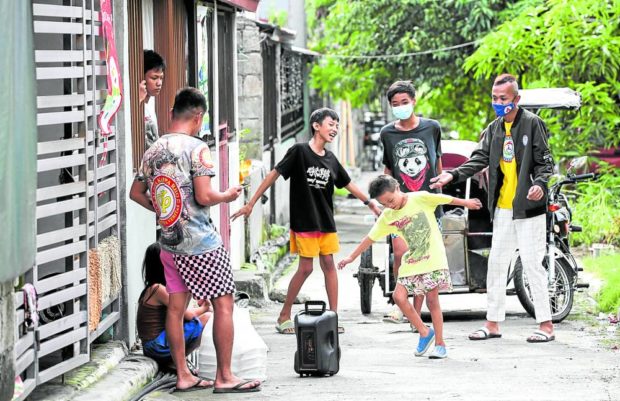
BRINGING CHEER IN THE NEIGHBORHOOD | Seven-year-old Kimuel Diaz (right) dances around a portable stereo together with Emmanuel Menina during a house-to-house visit by a group of children with disabilities in Bocaue, Bulacan. Menina has epileptic disorder while Diaz has Down syndrome. (Photo by LYN RILLON / Philippine Daily Inquirer)
MANILA, Philippines — Filipino families raising children with disabilities spend 40 to 80 percent more than those who do not, leaving them with poverty rates “that are 50 percent or higher” compared to other households.
These are among the findings in a study by the Department of Social Welfare and Development (DSWD) and the United Nations Children’s Fund (Unicef), which also made recommendations for the problems it identified.
Among those recommendations are the provision of disability allowances, the setup of a more comprehensive health database to improve the referral of children with disabilities to hospitals, and the reorientation of public policy to accommodate their needs.
The report titled “Cost of Raising Children with Disabilities in the Philippines” and funded by the Australian government was considered a “unique survey globally,” as the researchers said they were “not aware of a similar national survey focusing on children with disabilities in such detail and comprehensiveness.”
“[B]y far the main source of extra costs concerns health expenditure, where households with a disability card spent a share of their budget that was almost three times more than those of other households,” the report said.
The expenses included fees for consultations and therapies, medicines, and other assistive equipment, followed by transportation and education.
The study cited a family which had to spend P500 in transportation fares for each of the five times they consulted an optometrist. Another ended up picking a local clinic instead of a hospital because the fare was much lower.
“Travel to metropolitan areas was essential to access some services or medications. One family said they would travel three hours and spend P2,000 on fuel to obtain Tacrolimus, a drug to prevent organ rejection following their child’s transplant,” it added.
Level of access
While some families with disabled children would stay with relatives in Metro Manila to save on expenses, others had to travel to the capital region every day, including a parent who needed to have their child’s hemoglobin level monitored regularly.
“It was expensive and I’m still paying for it up to today,” the participant said.
The study also explored the level of access to basic services and fundamental rights as provided by the Convention on the Rights of the Child.
Access to basic services included health, improved water and sanitation facilities, adequate shelter and education, while fundamental rights referred to meeting acceptable nutritional standards and providing a “stimulating environment” for kids’ development, among others.
‘Highest neglect’
“The findings suggest that children with a disability card and their families were in a situation of systematic disadvantage across all the above dimensions, and the group with the highest neglect was made up of children with functional limitations without a disability card,” the report said.
It noted that a family with an 11-year-old boy suffering from epilepsy had to go to several health facilities for diagnosis.
Upon experiencing a seizure at 5 months old, the child was admitted to a public hospital only to be referred later to a private clinic for an electroencephalogram (EEG) test.
“The EEG cost P7,000 but this did not give a clear diagnosis,” the study said.
During a public forum on Dec. 3, Social Welfare Secretary Erwin Tulfo emphasized that while the DSWD had been conducting interventions to help families with children with disabilities, there was more to be done.
Recommendations
“I feel and I believe it is not enough. We will help families with children with disabilities to lighten the burden of expenses. It is really expensive… if you have a child or member of a family who has a disability,” Tulfo said.
Unicef Philippines representative Oyunsaikhan Dendevnorov called on the government, development partners and civil society to ensure that public policy would work for children with disability and their voices would be heard in the drafting of legislation.
“The situation of children with disabilities has long challenged the way we approach inclusiveness in development and nation-building. This study comes at a time when we are recovering from a pandemic that has exacerbated preexisting difficulties for vulnerable children,” she said.
Among the policy recommendations made by the study was the improvement of the Department of Health’s (DOH) database and the development of multiple entry and referral systems for early detection.
“The current registry managed by the DOH needs to increase its coverage and link disability assessment and registration with information about the needs and severity of the disability. Practical incentives must be provided for cities and municipalities to upload data into the central database,” it said.
There must also be a “disability allowance” with a flat amount of P1,000 to P2,000 for all children with a disability ID card to cover the extra cost of living, the study suggested.

